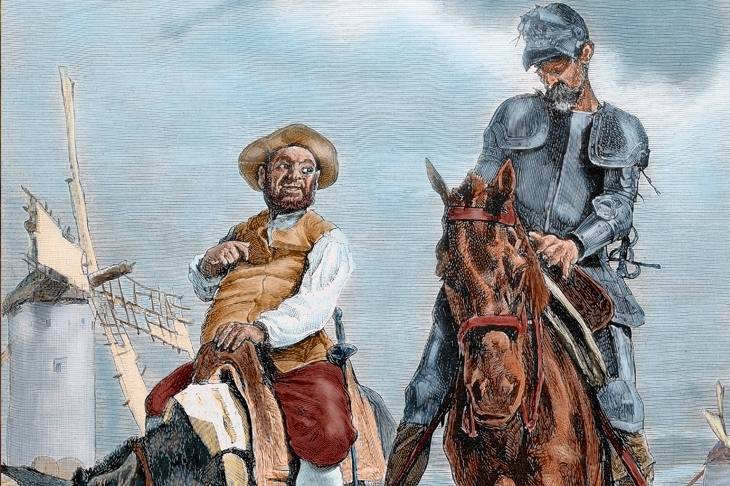I wonder what your idea of a good novel is. Does it embody the attributes of solid plotting, characterisation and an impermeable membrane between invention and reality — the novel, that is, being a box from which nothing can leap out, and into which nothing, except what the author has chosen to put there, can leap in? And does it conform to the conventions laid down by the great writers of the 19th century?
That’s what I assumed, during my schooldays; and the little that had filtered down to me of Don Quixote, which is claimed by many to be the ‘first’ novel, did not alert me to the fact that it was anything more than a story. As opposed to — to put it very simply indeed — a story about stories.
This assumption was blown to smithereens when I first came across The Life and Opinions of Tristram Shandy, Gentleman, and I started wondering whether Laurence Sterne was mad, or I was. How, I asked myself, could something so old seem so modern? It even made Ulysses look conventional. (I exaggerate for effect.)
This is the question that propels the first half of Javier Cercas’s charming and thoughtful essay on the novel. He cites Milan Kundera, who proposed dividing the history of the novel between its early, radical, innovative impulses (Quixote containing, in its way, all the possibilities of the novel form — although Cercas goes on to say that what should be called the ‘first’ novel is in fact an earlier Spanish work, Lazarillo de Tormes); its ‘absolute liberty’ — it could contain anything it liked, being itself a mestizo, bastard art form; and the 19th-century repression of these impulses. ‘It spurns or remains unaware of this substantial part of its inheritance.’
There is much to cheer in Cercas’s essay. There is also much to be exasperated by. It soon becomes clear that in order to follow his argument you’ll need to have read more than Cervantes, or Borges, or Kafka, or Melville, or any other of the touchstones you’d expect in this kind of discourse; you should have read a lot of Javier Cercas, too. Actually, that’s a bit unfair, so let me put it like this: by the end of the book, you will feel as though you have read quite a bit of Cercas’s fiction.
He starts by citing, in Chapter 2 (which is also the third page of his essay), his novel The Anatomy of a Moment, about the abortive coup of 23 February 1981, in which a group of Francoist civil guards stormed parliament. The only deputies who didn’t hide under their seats were Adolfo Suárez, a former Francoist, Manuel Gutiérrez Mellado, a former Francoist general, and Santiago Carrillo, a former leader of the anti-Franco movement during the dictatorship. Cercas uses history as the basis for a novel, or a fictive examination of the facts; not, he says, in order to make sense of the events, but to complicate them.
This is, I think, perfectly excusable. By the time you get to the end of his book, and his mention of The Impostor (‘my latest novel’), you will find that you have a passable grounding in almost the entire fictional output of Javier Cercas. But, perhaps not without a little sigh, I forgive him: there is so much insight and perceptive good sense here (‘a brilliant writer is one who creates a problem where none existed’), not to mention charm, that it is impossible to dislike this book; and it gives one faith in the continued possibilities of the novel.
It’s perhaps unfair to put Professor Tobin’s book in the same category. The rubric at the back of my copy encourages librarians to file it under ‘Literary criticism/Psychology’, and it becomes clear very quickly that it is the latter that is her job, and the former that is her enthusiasm. This isn’t a bad thing, but at times I wondered whether she couldn’t have pursued each of the subjects with a little more rigour.
What Tobin tries to dissect (and she quotes, in her first footnote, the line about dissecting humour being like dissecting a frog — ‘the thing dies’) is our pleasure in fictional surprises, in plot twists; the revelation of Ian McEwan’s Atonement, say, or, in Watership Down, General Woundwort and his cohorts’ astonishment at realising that Bigwig is not actually the Chief Rabbit of the warren they are attacking. (Anyone who cites Watership Down in a serious work gets a big thumbs-up from me. It is underrated as a work of art.)
The problem with this, though, is that throughout much of the book we are never quite sure whether Tobin is explaining literature for people who don’t read much — the examples she quotes are novels which are narratively conventional as opposed to postmodern or experimental — or explaining cognitive science (her academic discipline) for people who don’t read too much of that. She cites the Sally–Anne test, which determines how infants are unable to enter the minds of others, and you can see why she does so, for the purposes of her work; but even I’ve heard of the Sally–Anne test, and I wonder whether her citation of it is really going to help us understand how fiction works.
Too much of the time I felt I was being given a lecture on the obvious, sometimes delivered not quite as effectively as the author might have intended. ‘These surprises tap into the curse of knowledge with ruthless efficiency, making them a powerful delivery system for interpretive realignment.’ Or, to paraphrase: surprises can be surprising. Well, at least it’s nice to know that a supposedly formally conventional novel can still trip us up.






Comments